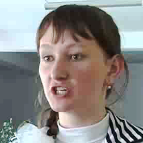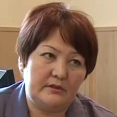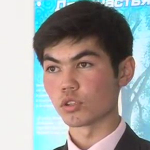In a school in the town of Cholpon-Ata, students are learning basic biology, history, and Kyrgyz epic poetry. This school, named after the Kyrgyz poet Alykul Osmonov, has a new roof, better teachers, and school supplies like computers and DVD players. One sign of the school’s popularity is that, in the last five years, it has doubled its enrollment to 1,019 students.
Tatiana Masenzova is a vibrant 10th grade student who is planning to study abroad next year. “The physical improvements in the school have helped us learn more, and with the help of computers, I can use the Internet. I’ve broadened my knowledge of the world,” she says.
The school’s Russian language teacher agrees, saying the physical environment at the school has had an impact on her students. “Not only in teaching but in general, learning has improved very significantly,” explains Gulnara Abdikadirova. “We used to work without equipment, software, and now we can teach in an integrated way, connecting our subject with other subjects.”



